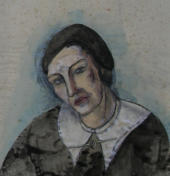



All texts copyright Richard Shillitoe
biography
Andromaque Kazou:
lesbian shore
During the early months of Humfry Payne’s
pursuit of her in 1933, Colquhoun was
infatuated with a rather older Greek woman
named Andromaque Kazou. Her appearance in
Colquhoun’s life was powerful, but short-lived.
Colquhoun made some ink and watercolour
sketches of her and a fully worked oil portrait. Time has not been kind to
the sketches; several have suffered mould or insect damage. The oil
painting has not been seen since its sale in 1977.
The first part of their friendship is described in “Lesbian Shore”, a lengthy text that exists in a number of
longhand drafts. It went through substantial revisions, but may have been abandoned incomplete. (1)
Colquhoun saw her first across a dining-room in an hotel on Mykonos. For several days she could not take her
eyes off her, fantasising:
my mind wandered into a Kabalistic reverie, of how each type of beauty has its own place in
the tree of life, and how the signs of the Zodiac, and the planets that are at home in them,
can influence the forms of the body. Her beauty must be lunar, I thought; her morbid charm
derives from the pallid spell-weaving of Hecate. … Her rhythm is of the watery element — she
owes to the sea-ruling constellation of the Crab, the moon’s only mansion; she shares that
attractive force which draws the tides. The moon pulls up the emotional surge, the waters
that are under the earth; she stirs that cauldron of abundance where the dissolving past is
recalled, the unformed future given a voice.
She began to become aware of her feelings:
I did not try to analyse the stirrings within me, I could not reflect upon them while thus borne
along. It was not until later and in calmer intervals, that I recognised this torrent that swirled
me onwards as the ‘swift Hebrus’. I was being carried, indeed, to the ‘Lesbian shore’.
Here the manuscript ends abruptly, and the story has to be pieced together from Kazou’s letters. They
are written in French, which was not her first language, but she is far less circumspect than Colquhoun:
I’ve always had extremely strong feelings for you and I’ve hidden my true sentiments under a
mask of indifference and sometimes hostility… I don't believe that anybody could ever guess
the extent of my love and affection…
and:
I often ask myself, do you also dream about what it would have been like if we had stayed
only friends? Who are your friends over there? What are they like? I want to know everything
that has happened since you arrived. How’s your studio, is it nice? Have I properly understood
what you asked me? Like we said in Paris, I do not think that it will be too difficult to sort
everything out, just find me a way to get a bit of money, just two or three French lessons or
something. In any case, we should begin with this life together in Paris.
then she gets cold feet:
I am mystified that you could ever think that I would come to London. No! These are the
things that we say but cannot actually do as it is too difficult to change a way of life and all
our habitual routines, especially the routines of a spoilt lady. It is because I was serious about
seeing you until you became so enthusiastic all of a sudden. That was all, my experience
ended.
And that was that. Kazou disappeared from view, as quickly as she had arrived. The paucity of hard evidence
invites speculation – or fantasy – but the relationship was clearly more than a passing fascination. How much
more we will probably never know.
Notes:
The title is taken from “Lycidas” by John Milton, the poem in which he mourns the death of a friend by
drowning:
His gory visage down the stream was sent,
Down the swift Hebrus to the Lesbian shore



































